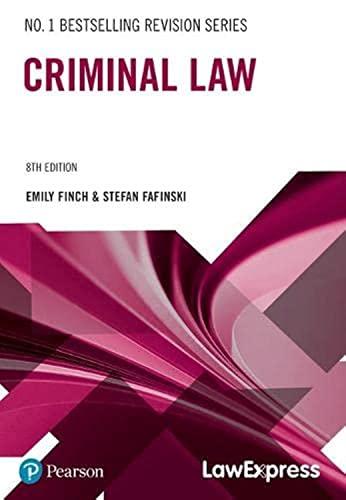Question
Please help me reply back to this discussion post with agreeing and/or adding additional information...Thank you! What is the common law's traditional viewpoint concerning a
Please help me reply back to this discussion post with agreeing and/or adding additional information...Thank you!
What is the common law's traditional viewpoint concerning a bystander's duty to come to the aid of a person in need? How, if at all, is that duty different today? How might it differ depending on who the bystander is? Describe a hospital's duty to a person who comes to the emergency department requesting treatment. Is this duty the same if the person is indigent?
Under traditional common law an individual has no duty to aid another person even if they are in a dangerous or life-threatening situation (Showalter, 2020). This doctrine remains the same today. Additionally, there is no differentiation of this doctrine dependent upon who the bystander in need is. "However, if an individual negligently creates the need for a rescue, then a duty to rescue may arise for that individual. Furthermore, if an individual initiates a rescue attempt, that individual may be liable if they are negligent in their rescue attempt (Cornell Law School, 1992)."
The Emergency Medical Treatment & Labor Act (EMTALA) mandates that any individual who presents to a hospital's emergency department has the right to receive an appropriate medical evaluation (Showalter, 2020). It also mandates that if the patient is found to have an emergent medical condition that the hospital must, to the extent of its abilities, stabilize the patient (Showalter, 2020). In terms of indigent persons, EMTALA specifically states that individuals have the right to receive appropriate medical evaluation and stabilization of emergent conditions if they are seeking medical care at an emergency room regardless of an individual's payment method or insurance status (Zibulewsky, 2001). In this way, EMTALA ensures that indigent individuals have access to medical screenings and emergency care.
Cornell Law School. (1992).Rescue Doctrine.https://www.law.cornell.edu/wex/rescue_doctrine
Showalter, S. (2020)The Law of Healthcare Administration, Ninth Edition: 9. Health Administration Press. Kindle Edition.
Zibulewsky, J. (2001, October).The Emergency Medical and Active Labor Act (EMTALA): what it is and what it means for physicians.https://www.ncbi.nlm.nih.gov/pmc/articles/PMC1305897/
Step by Step Solution
There are 3 Steps involved in it
Step: 1

Get Instant Access to Expert-Tailored Solutions
See step-by-step solutions with expert insights and AI powered tools for academic success
Step: 2

Step: 3

Ace Your Homework with AI
Get the answers you need in no time with our AI-driven, step-by-step assistance
Get Started


